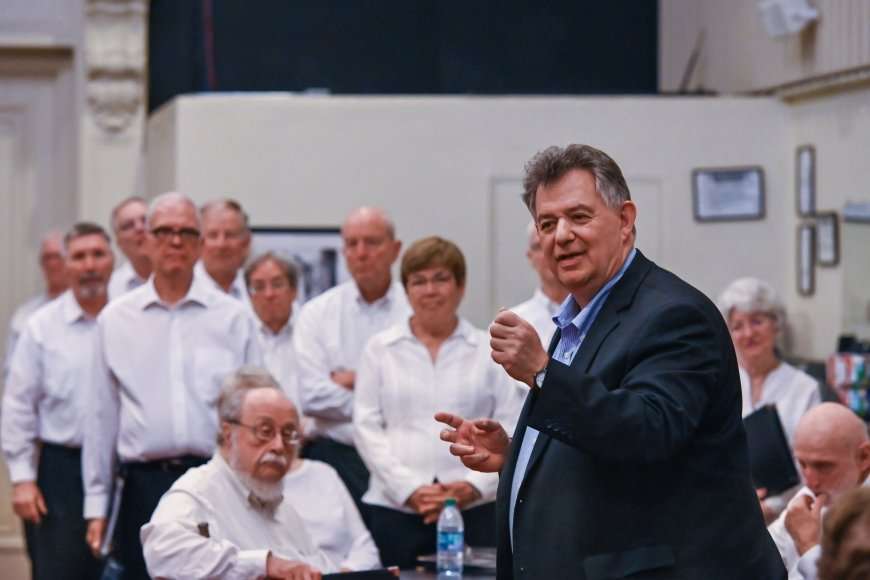
An Interview with Frank Nemhauser: Part 1
Berkshire Choral International recently sat down with Music Director Frank Nemhauser to discuss the BCI experience. Now entering his 34th season, Frank carefully crafts each of the weekly programs, hires the faculty and selects the finest conductors, whose impressive musical skills and engaging personalities offer participants an unrivalled musical journey. To say that Frank is the “beating heart” of the organization is no exaggeration. Beloved by choristers, conductors, faculty and colleagues alike, he works tirelessly to design a meaningful choral experience that creates memories for a lifetime.
BCI: Can you describe the BCI experience?
FN: It’s a choral immersion program for people who are passionate about singing choral music. We cover many of the masterworks of the choral/orchestral repertoire. Singers have the opportunity to work with great conductors in putting together a concert with orchestra in just one week’s worth of rehearsal time. In addition to rehearsals and the performance, there’s a large educational component, which adds a great deal to the experience of our choristers. It involves a lot of hard work and a lot of fun.
The great conductor Robert Page was the very first BCI conductor and he described the people who come to a BCI weekend as “Choroholics.” I think that’s a great way to think about our choristers: they just love singing choral music and love singing with us.
What have you enjoyed most?
One of the most gratifying parts about my job is that everyone wants to be there – the choristers, faculty, the apprentices, and the conductors. We create an atmosphere in which everyone is working toward one goal: putting on the best concert possible. It takes a village!
How does one prepare a major — and challenging — choral work in seven short days?
We prepare study resources for all of our singers in order to help them learn the music. We provide audio files, with individual voice parts emphasized and with actual voices singing the text, so our choristers can hear their part along with all the other parts.
I have found that most of our choristers arrive having put in a great deal of time to learn the music. In addition to the full rehearsals with the conductor, we have sectional rehearsals led by faculty, and we provide classes which help them musically.
Participants say how much they love the musical activities. Can you talk about the schedule?
There are about five hours of rehearsals each day. Depending on which week you attend, these take place either morning and evening or morning and afternoon. Faculty members offer classes that cover a wide-variety of subjects, voice, musicianship, a lecture on the week’s composer, music history, and performance. I often interview the conductor in a “question-and-answer” session open to the choristers. We have master classes for apprentices which our choristers attend. Of course, there’s time for participants to take tours and see the sights and sounds of the city we are visiting. We also have the opportunity to relax and get to know each other during meals and social events.
What is the role of the faculty and how do they enrich the experience?
We hire professional musicians as faculty. They are either singers, conductors or both. They sing with the chorus at all rehearsals and the performance, lead sectional rehearsals, teach classes and are available to give voice and musicianship lessons.
What are the musicianship classes?
We teach the choristers how to improve their reading skills, as well as music theory, rhythm, or sight singing. The faculty lend musical support to all our choristers.
BCI has engaged amazing conductors over the years, including many giants of the choral world. How do you choose the conductors and what qualities do you look for?
I am looking for someone who has either name recognition or whose position may be notable. For example, twice we’ve hired the conductor of the Mormon Tabernacle Choir. People might not recognize the name of that person, but they know the position of the conductor of the Mormon Tabernacle Choir. It’s also a combination of musical and personal factors. I am not only looking for someone with strong musical skills, but also the right interpersonal skills to work with a group of volunteer singers who come together with no audition. One must be a good teacher to put a show together in just one week.
The choristers comment so positively about their connection to the conductor. Can you describe the dynamic?
Each of our conductors has his or her own strengths. And, I think our choristers respond not only to the musical knowledge, but also to the personal commitment the conductors make.
The conductors also respond to the enthusiasm of our choristers. Many, many years ago David Stivender, who was the conductor of the Metropolitan Opera Chorus, conducted for us a few times. One of our choristers asked him: “What’s it like for you? You get to work with the Metropolitan Opera Chorus. How can you stand dealing with us?” I am paraphrasing, but he said with great affection: “When I come to BCI, I stand before 200 puppy dogs wagging their tails, ready to to do whatever I ask of them.”
I find the enthusiasm of our choristers to be unmatched and this rubs off on the conductors, faculty, the apprentices, and everybody involved. Together, we achieve what we never imagined was possible. The process is exhilarating and the end results are gratifying.
Tell us about the 2020 season.
I think we’ve got four terrific conductors, four terrific venues, and spectacular music! It doesn’t get any better than that.
Stay tuned for Part II, in which Frank discusses the conductors, venues, and repertoire planned for the 2020 summer weeks.